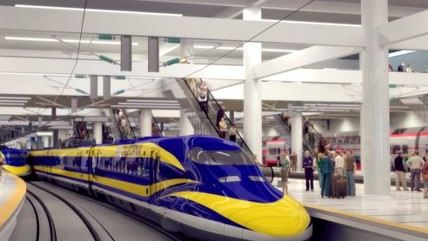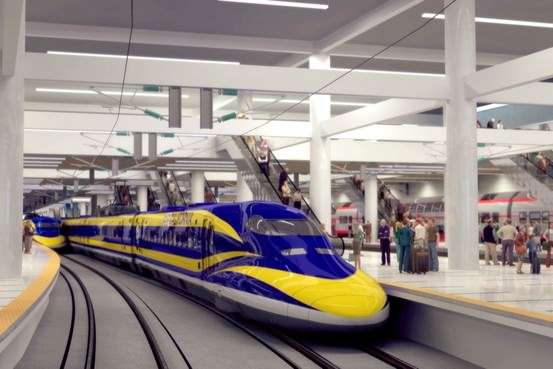Latest Calif. High-Speed Rail Defense Banks on Folks Not Grasping Sunk Costs Fallacy
State argues that trains that aren't even built yet can't be stopped


As noted by the Associated Press (and covered over at Reason 24/7) the California High-Speed Rail Authority is pressing forward and hammering out a route for the first stretch of its $68 billion line in the middle of the state, though landowners south of the Fresno area seem united in opposition.
The work continues in the face of massive uncertainty. A judge in August ruled in a lawsuit against the train's construction that the current plan is in violation of the Proposition 1A, the ballot initiative authorizing the project. Among the many, many problems with the rail project, the judge focused on the state's failure to secure any funding beyond the first segment scheduled to begin construction. The law requires that the all funding must be secured for a designated "initial operating segment," not the useless stub of a train route currently in planning.
But the judge at the time declined to actually shut the project down. Instead he asked both sides to submit more info, giving the state another chance to prove that there is more money coming for the project.
But there's no more federal money in the works, not while the Republican Party controls the House. And there's still no sign of any private investment in the boondoggle. So unless the state is able to cough up more money, what could they argue?
The state did respond to the judge's request with a rather curious argument. They don't actually claim that the project is legal. Instead attorneys argue that the federal money the state has already received for the project is not bound by the ballot initiative. Therefore the state can begin construction with just the tiny (figuratively speaking) chunk of stimulus funds. The Los Angeles Times reports:
The first operational bullet train segment will cost $31 billion and run from Merced to the San Fernando Valley, according to state officials. But they have only identified about $12 billion in available funds.
The new spending strategy could bypass potential legal obstacles posed by the case in Kenny's court. Attorneys for the California High Speed Rail Authority asserted in Friday's court filing that legal restrictions apply only to state money and do not affect $3.24 billion in federal grants awarded for the project.
Originally, the state had to match the federal grant money with state money as the project progressed. But the Obama administration, which strongly supports the project, agreed last December that the state could use all of the federal grants before putting in matching state funds.
The state's argument, then, is that the government could begin construction and then … what exactly? They would have to shut down again after building only a quarter of this first non-functioning segment. It seems as though they're warning that they can begin construction anyway and are just hoping that once the track starts getting laid, people will relent because, after all, it's already started.
Over at Cal Watchdog, Chris Reed argues that lack of actual defense of the train project is due to Attorney General Kamala Harris' political ambitions. She may not want her fingerprints all over this pending disaster in the coming years:
The former San Francisco district attorney is running for governor in 2018, and she doesn't want the bullet train as a part of a record she must defend. If she battles for approval of its basic business plan, she takes partial ownership of responsibility for the project's ultimate fate. One doesn't have to be a Republican or have a train phobia to expect it to be a debacle if it proceeds. One only has to have read the nonpartisan, respected state Legislative Analyst's Office's various analyses of the project's many problems.
These problems are why the project is plunging in the polls to the point where 70 percent of voters want a second chance to vote on the $9.95 billion in state bonds, presumably so they can rescind their gift of taxpayer funds.
Read his whole analysis here.
Note though, there's still that federal issue. The current block behind getting more train funding is because of GOP control of the House. So when 2014 rolls around, the outcome of the midterm elections, even beyond California, could impact whether the train will get more federal assistance. The $3.24 billion in federal funds may not get much of anything done, but it will cause the project to drag on nicely until the election. If the Democrats gain control of the House (and keep control of the Senate), then federal train funding may be back on the table.


Show Comments (24)